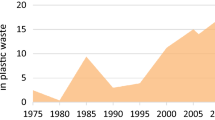Abstract
This paper indicates that the performance of tack-back and treatment of electronic waste (e-waste) system can be improved substantially. This can be reached by better taking into account in a better way the big variety in material composition and potential toxicity of electrical and electronic products - from a technical, organizational and regulatory perspective. Realizing that there is no ‘one size fit for all’ and combining smart tailor made solutions with economic of sale will result in the best environmental gain/cost ratio. Several examples show how science and engineering have supported or will support this approach.
Similar content being viewed by others
References
Widmer R, Oswald-Krapf H, Sinha-Khetriwal D, Schnellmann M, Böni H. Global perspectives on e-waste. Environmental Impact Assessment Review, 2005, 25(5): 436–458
Robinson B H. E-waste: an assessment of global production and environmental impacts. Science of the Total Environment, 2009, 408(2): 183–191
Ogunseitan O A, Schoenung J M, Saphores J D, Shapiro A A. Science and regulation. The electronics revolution: from ewonderland to e-wasteland. Science, 2009, 326(5953): 670–671
Sepúlveda A, Schluep M, Renaud F G, Streicher M, Kuehr R, Hagelüken C, Gerecke A C. A review of the environmental fate and effects of hazardous substances released from electrical and electronic equipments during recycling: examples from China and India. Environmental Impact Assessment Review, 2010, 30(1): 28–41
Stone R. China. Confronting a toxic blowback from the electronics trade. Science, 2009, 325(5944): 1055–1056
Nnorom I C, Osibanjo O. Electronic waste (e-waste): material flows and management practices in Nigeria.Waste Management, 2008, 28(8): 1472–1479
He W, Li G, Ma X, Wang H, Huang J, Xu M, Huang C. WEEE recovery strategies and the WEEE treatment status in China. Journal of Hazard Material, 2006, 136(3): 502–512
Hicks C, Dietmar R, Eugster M. The recycling and disposal of electrical and electronic waste in China-legislative and market responses. Environmental Impact Assessment Review, 2005, 25(5): 459–471
Nnorom I C, Osibanjo O. Overview of electronic waste (e-waste) management practices and legislations, and their poor applications in the developing countries. Resource Conservation Recycling, 2008, 52(6): 843–858
Davis G, Heart S. Electronic waste: The local government perspective in Queensland, Australia. Resource Conservation Recycling, 2008, 52(8–9): 1031–1039
Barba-Gutiérrez Y, Adenso-Díaz B, Hopp M. An analysis of some environmental consequences of European electrical and electronic waste regulation. Resource Conservation Recycling, 2008, 52(3): 481–495
Khetriwal D S, Kraeuchi P, Widmer R. Producer responsibility for e-waste management: key issues for consideration-learning from the Swiss experience. Journal of Environmental Management, 2009, 90(1): 153–165
Huisman J, Magalini F, Kuehr R, Maurer C. Lessons from the WEEE review research studies. In: Proceedings of Electronics Goes Green Conference. Berlin, 2008
Yoshida F, Yoshida H. Japan, the European Union and waste of electrical and electronic equipment: key lessons learned. Environmental Engineering Science, 2010, 27(1): 21–28
Hagelüken C, Meskers C. Mining our computers: opportunities and challenges to recover scarce and valuable metals from end-of-life electronic devices. In: Proceedings of Electronics Goes Green Conference. Berlin, 2008
Wang F, Huisman J, Marinelli T, Zhang Y, van Ooyen S. Economic conditions for formal and informal recycling of e-waste in China. In: Proceeding of Electronics Goes Green Conference. Berlin, 2008
Wang F, Huisman J. Formalization of e-waste collection and recycling in China. In: Proceedings of Trans-Waste Final Conference: Less waste, more resources-Reuse and the informal sector in Europe. Budapest, 2012
Zhu S, He W, Li G, Zhuang X, Huang J, Liang H, Han Y. Estimating the impact of the home appliances trade-in policy on WEEE management in China. Waste Management and Research, 2012, 30(11): 1213–1221
Huisman J. QWERTY and eco-efficiency analysis on treatment of CRT containing appliances at metallo-chimique NV, the eco-efficiency of treating CRT glass fractions versus stripped appliances in secondary copper-tin-lead smelter. Report Written for Metallo-Chimique NV, 2004
Stevels A, Huisman J. Industry vision on the implementation of WEEE and RoHS. In: Proceedings of EcoDesign 2003 Conference. Tokyo, 2003
Nissen N F, Griese H, Middendorf A, Muller J, Potter H, Reichl H. Environmental assessments of electronics: a new model to bridge the gap between full life cycle evaluations and product design. In: Proceedings of International Symposium on Electronics and Environment. San Francisco, 1997
Stevels A, Boks C. The lasting advantages of Disassembly Analysis, benchmarking applications in the electronics industry. In: Proceedings of CARE conference on’ Green Electronics’. Vienna, 2002
Author information
Authors and Affiliations
Corresponding authors
Rights and permissions
About this article
Cite this article
Stevels, A., Huisman, J., Wang, F. et al. Take back and treatment of discarded electronics: a scientific update. Front. Environ. Sci. Eng. 7, 475–482 (2013). https://doi.org/10.1007/s11783-013-0538-8
Received:
Accepted:
Published:
Issue Date:
DOI: https://doi.org/10.1007/s11783-013-0538-8




